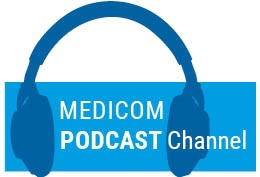Findings from the phase 3 EMPEROR-Reduced trial show that the sodium-glucose cotransporter 2 (SGLT2) inhibitor empagliflozin reduces cardiovascular death or hospitalisation for heart failure (HF) in patients with a reduced ejection fraction, as compared with placebo [1-3]. These cardiovascular improvements were independent of the presence of diabetes mellitus.
Previously, the DAPA-HF trial showed that the SGLT2 inhibitor dapagliflozin reduced the risk of cardiovascular death or hospitalisation for heart failure in patients with reduced ejection fraction, regardless of whether they had diabetes [4]. That trial primarily enrolled patients (n=4,744) with mild-to-moderate degrees of left ventricular systolic dysfunction and increases in natriuretic peptide levels. More evidence was needed on the effects of SGLT2 inhibitors in patients across the broad spectrum of heart failure, including those with a markedly reduced ejection fraction.
The EMPEROR-Reduced trial, presented by Dr Milton Packer (Baylor University Medical Center, USA), evaluated empagliflozin in 3,730 patients with mild, moderate, or severe chronic heart failure (i.e. class II, III, or IV) due to poor systolic function of the left ventricle (ejection fraction ≤40%) with or without diabetes type 2 diabetes (49.8% had diabetes). They randomly received empagliflozin (10 mg once daily) or placebo, in addition to appropriate treatments for heart failure.
The primary outcome of EMPEROR-Reduced was a composite of cardiovascular death or hospitalisation for worsening heart failure. During a median of 16 months, a primary outcome event occurred in 19.4% of patients in the empagliflozin group and in 24.7% in the placebo group (HR 0.75; 95% CI 0.65-0.86; P<0.001; see Figure). This effect of empagliflozin was consistent in patients regardless of the presence of diabetes.
Figure: Primary endpoint analysis for EMPEROR-Reduced [1]

The annual rate of decline in the estimated glomerular filtration rate was slower in the empagliflozin group compared with the placebo group (P<0.001). In addition, empagliflozin-treated patients had a lower risk of serious renal outcomes. Uncomplicated genital tract infection was reported more frequently with empagliflozin.
The EMPEROR-Reduced results confirm the DAPA-HF outcome that SGLT2 inhibitors have clinically important benefits and are well tolerated. According to Dr Packer, the findings from both trials now provide compelling evidence that SGLT2 inhibitors should be added to currently recommended treatments for patients with and without diabetes with chronic heart failure and a reduced ejection fraction.
- Packer M. EMPEROR-Reduced: Empagliflozin in heart failure with a reduced ejection fraction, with and without diabetes. Hot Line 1, ESC Congress 2020, 29 Aug.
- Packer M, et al. New Engl J Med. 2020; August 29. DOI: 10.1056/NEJMoa2022190.
- Zannad F, et al. The Lancet. 2020; August 30. DOI: 1016/S0140-6736(20)31824-9.
- McMurray JJ, et al. N Engl J Med. 2019 Nov 21;381(21):1995-2008.
Posted on
« First-in-class cardiac myosin inhibitor effective in obstructive hypertrophic cardiomyopathy Next Article
2020 Adult Congenital Heart Disease Guidelines »
Table of Contents: ESC 2020
Featured articles
2020 ESC Clinical Practice Guidelines
2020 Atrial Fibrillation Guidelines
2020 Non-ST-Segment Elevation Acute Coronary Syndromes Guidelines
2020 Sports Cardiology and Exercise in Cardiovascular Patients Guidelines
2020 Adult Congenital Heart Disease Guidelines
Hot Line Presentations
SGLT2 inhibitor improves cardiovascular outcomes in heart failure patients
First-in-class cardiac myosin inhibitor effective in obstructive hypertrophic cardiomyopathy
Reduced cardiovascular outcomes with early rhythm control
Trimetazidine after successful PCI not associated with fewer cardiac events
POPular TAVI: Aspirin-only antiplatelet strategy?
Reduced NT-proBNP in HFpEF with sacubitril/valsartan
DAPA-CKD: Dapagliflozin improves CKD survival ± diabetes
Low-dose colchicine reduces CV death and ischaemic events in coronary disease
Similar outcomes sPESI and HESTIA for pulmonary embolism triage
Antihypertensives also reduce CV risk in people with normal blood pressure
COVID-19: Continuing versus suspending ACE inhibitors and ARBs
Drug initiation strategy not associated with increased use of oral anticoagulants
Restrictive blood transfusion non-inferior and cost-effective strategy
Late-Breaking Science
Increased mortality with colchicine in patients with ACS
Rivaroxaban protects limbs and ischaemic events in CAD-PAD patients
Antisense APOC3 oligonucleotide lowers triglyceride and atherogenic lipoproteins
Antisense ANGPTL3 lowers triglycerides
Reduced progression of coronary atherosclerosis with icosapent ethyl
Digoxin improves symptoms in stable patients with permanent AF
SGLT2 inhibitor ertugliflozin shows similar mortality but fewer HF hospitalisations
COVID and Cardiovascular Disease
Risk factors for thromboembolism and bleeding in COVID-19: lessons from Wuhan
The Yale COVID-19 Cardiovascular Registry
COVID-19 treatments and the importance of randomised trials
Related Articles

ESC 2020 Highlights Podcast
Similar outcomes sPESI and HESTIA for pulmonary embolism triage
© 2024 Medicom Medical Publishers. All rights reserved. Terms and Conditions | Privacy Policy
HEAD OFFICE
Laarderhoogtweg 25
1101 EB Amsterdam
The Netherlands
T: +31 85 4012 560
E: publishers@medicom-publishers.com

